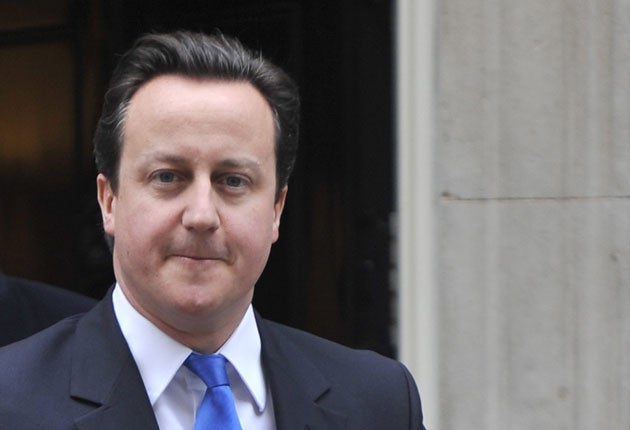Cameron frustrated with Obama's refusal to act over no-fly zone

Tensions were building between London and Washington last night over President Barack Obama's apparent equivocation about whether to back plans to impose a no-fly zone on Libya.
Impatience is growing over the conflicting signals coming out of the White House and Downing Street is struggling to obtain a clear sense of American thinking on the issue.
The US Defence Secretary Robert Gates has condemned "loose talk" over no-fly zones, while the Secretary of State, Hillary Clinton, has struck a more supportive note. The President is said to be "reviewing the options".
It led Britain, in alliance with France and Lebanon, to try to force the issue by tabling the joint resolution that was being considered last night by the United Nations Security Council. The three countries were yesterday still waiting for a signal from the US over whether it supports the move.
President Nicholas Sarkozy of France wrote to all the government leaders of the Security Council members exhorting approval of the no-fly zone provisions in the resolution. "Together, let's save the martyred Libyan people! It is now a matter of days, even hours," he wrote.
Susan Rice, the US ambassador to the UN, indicated last night at the closed-door meeting that any agreement to impose no-fly zones over Libya may not be enough and that additional military intervention might be necessary including airstrikes on tank columns. While Ms Rice seemed to offer support for more than just no-fly zones, it could also be that she was trying to issue a warning that once the military door is opened additional entanglement might be hard to resist.
The gravity of the proposals was still giving many members pause and some diplomats warned that a resolution may yet emerge with all military provisions stripped from it. Countries had "a number of questions about the text," acknowledged Mark Lyall Grant, the British ambassador.
The Government's frustration over the lack of a clear lead from the White House threatens to cast a pall over transatlantic relations over coming months. David Cameron briefly betrayed his frustration in the Commons yesterday over the diplomatic delays as Muammar Gaddafi's forces seize back land held by the rebel forces.
He said: "Of course there are a wide range of views in the UN. But I would urge others to take the right steps so that actually we show some leadership on this issue and make sure we get rid of this regime."
As negotiations dragged on last week over no-fly zones, Alain Juppe, the French Foreign minister, protested: "The Americans haven't yet defined their position on Libya." Privately Britain shares his irritation over the US stance, shared by Mr Obama's domestic political opponents.
The senior Senate Republican, Lindsey Graham, said: "If he does not act decisively in Libya, I believe history will show that the Obama administration owned the results of the Gaddafi regime from 2011 forward," he said. "Their refusal to act will go down as one of the great mistakes in American foreign-policy history and will have dire consequences for our own national security in the years to come."
Mr Cameron's spokesman said last night that the Prime Minister was very focused on "trying to move the debate forward."
Before the Security Council meeting, William Hague, the Foreign Secretary, rejected suggestions that the new resolution had "zero chance" of success. But he acknowledged that the no-fly zone could not be put in place by the UK and France without wider support.
The UN Secretary General, Ban Ki-Moon, last night called for a ceasefire by both sides saying he was "gravely concerned" about a government assault on Benghazi. Bombarding such a city "would massively place civilian lives at risk," Mr Ban said.
Subscribe to Independent Premium to bookmark this article
Want to bookmark your favourite articles and stories to read or reference later? Start your Independent Premium subscription today.

Join our commenting forum
Join thought-provoking conversations, follow other Independent readers and see their replies